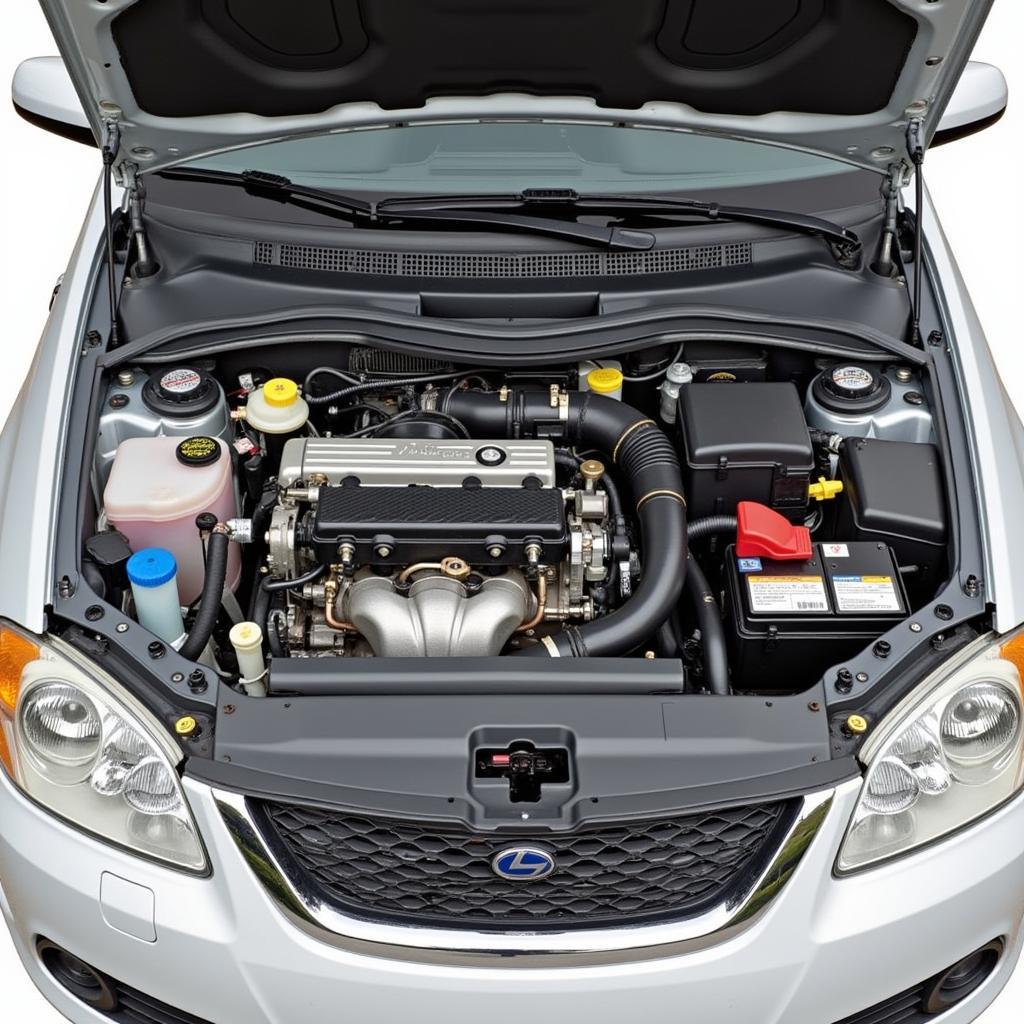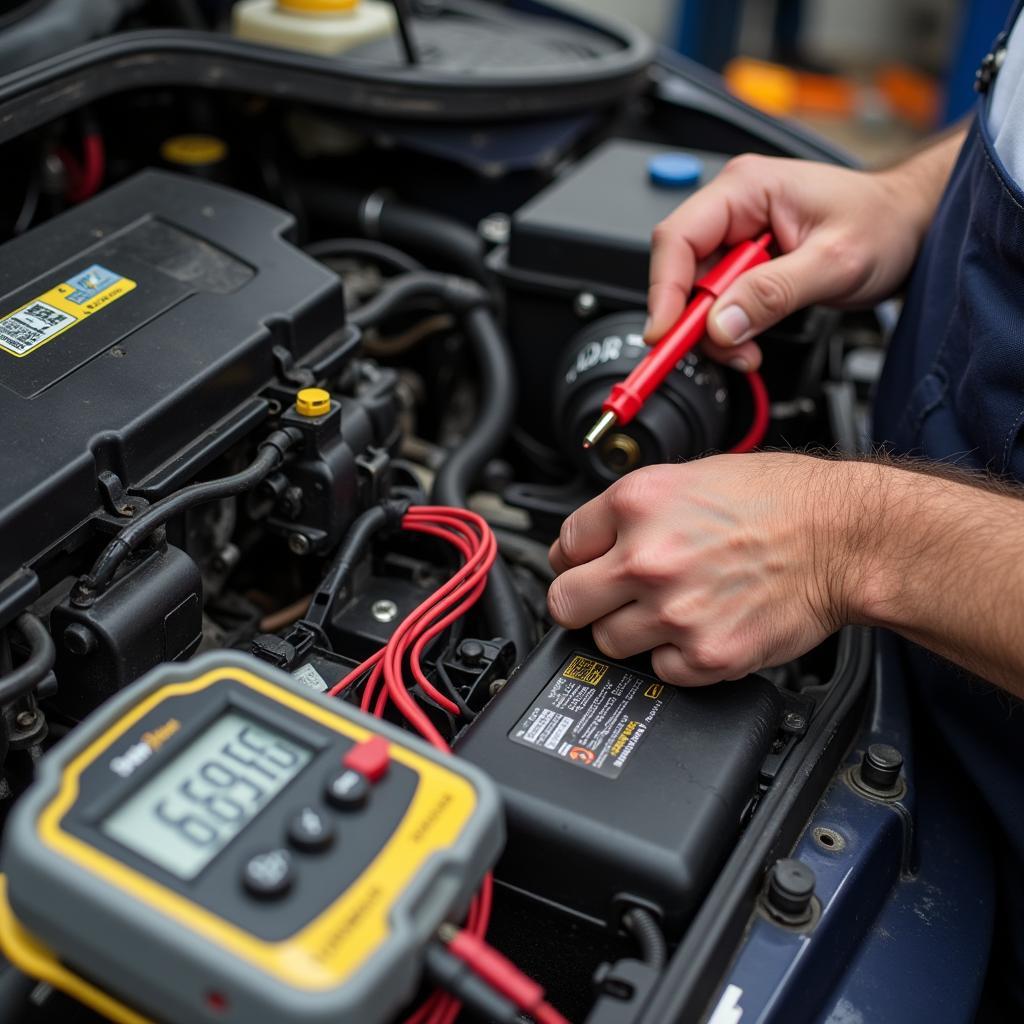Understanding the symptoms of a failing car starter is crucial for any car owner. A faulty starter can leave you stranded, so recognizing the warning signs is the first step to getting back on the road. This guide provides a deep dive into automatic car starter problems, their symptoms, and solutions.
 Automatic Car Starter Problems Symptoms: A car with the hood open, showing the starter motor and connected wiring, highlighting potential problem areas.
Automatic Car Starter Problems Symptoms: A car with the hood open, showing the starter motor and connected wiring, highlighting potential problem areas.
Common Automatic Car Starter Problems Symptoms
Several symptoms can indicate a failing car starter. These can range from subtle clicks to a complete absence of any response. Being aware of these signs can help you diagnose the issue early and prevent further damage. Here are some of the most common Automatic Car Starter Problems Symptoms:
- Clicking Sounds: One of the most tell-tale signs is a rapid clicking sound when you turn the key. This usually indicates a failing solenoid, the electrical component responsible for engaging the starter motor.
- Grinding Noise: A grinding noise signifies that the starter motor is engaging but the pinion gear is not meshing correctly with the flywheel. This can be due to a worn-out starter or a problem with the flywheel teeth.
- Slow Cranking: If your engine cranks slowly, especially in cold weather, it may point to a weak starter motor or a low battery.
- No Response: If turning the key results in no sound or action, the starter motor may be completely dead or there might be a problem with the ignition switch or wiring. This is a situation where knowing about issues like a car self starter problem can be extremely helpful. You can learn more about this in our dedicated article about car self starter problem.
- Intermittent Starting: Sometimes the car starts perfectly, and other times it doesn’t. This inconsistency can be frustrating and is often caused by a loose connection, a failing solenoid, or a worn-out starter.
- Smoke: Smoke coming from the starter area suggests an electrical short circuit, which can be dangerous and requires immediate attention.
Troubleshooting Your Car Starter
 Car Starter Troubleshooting Tips: A mechanic using a multimeter to test the voltage of a car battery and checking the connections to the starter motor.
Car Starter Troubleshooting Tips: A mechanic using a multimeter to test the voltage of a car battery and checking the connections to the starter motor.
Identifying the specific problem requires a systematic approach. Here are some steps to troubleshoot your car starter:
- Check the Battery: Ensure your battery has sufficient charge. A weak battery can mimic starter problems.
- Inspect the Connections: Check for loose or corroded connections at the battery terminals, starter solenoid, and ignition switch. Clean or tighten any loose connections.
- Test the Starter: You can test the starter by using a multimeter or jumper cables. This will help determine if the starter is receiving power and functioning correctly.
- Check the Ignition Switch: A faulty ignition switch can prevent power from reaching the starter.
- Inspect the Flywheel: Check for damaged flywheel teeth, which can prevent the starter from engaging properly. If you suspect a brake issue is affecting starting, you may want to explore articles like brake system problem car won’t start.
Why is My Car Not Starting? Could it be the Starter?
Yes, a failing starter is a common reason for a car not starting. However, other factors like a dead battery, a faulty ignition switch, or a fuel system problem can also prevent the engine from starting.
“A thorough inspection is key,” says John Davis, a certified automotive technician with 20 years of experience. “Don’t just assume it’s the starter. Check all related components before replacing any parts.”
How Much Does it Cost to Replace a Car Starter?
The cost to replace a car starter can vary depending on the make and model of your vehicle and the labor costs in your area. Typically, the price ranges from $200 to $500, including parts and labor. For certain vehicles, issues with the automatic brake system can also prevent starting. If you own a CRV, you might find our article on crv automatic brake system problem car won’t start helpful.
Preventing Car Starter Problems
Regular maintenance can help prevent car starter issues. Keeping your battery terminals clean and ensuring all connections are tight can prolong the life of your starter.
“Preventive maintenance is crucial,” adds Maria Sanchez, an electrical systems expert. “Regular checks can save you from costly repairs down the line.” You may also be interested in understanding how worn starter contacts contribute to problems, which you can explore in our article car starter worn contacts problems.
Conclusion
Understanding automatic car starter problems symptoms is essential for any driver. By recognizing the warning signs and taking appropriate action, you can avoid being stranded and keep your car running smoothly. Remember, early diagnosis and proactive maintenance can save you time and money in the long run. If you’re experiencing persistent car starting problems or need professional assistance, don’t hesitate to contact AutoTipPro at +1 (641) 206-8880. Our office is located at 500 N St Mary’s St, San Antonio, TX 78205, United States. We’re here to help get you back on the road.




Leave a Reply